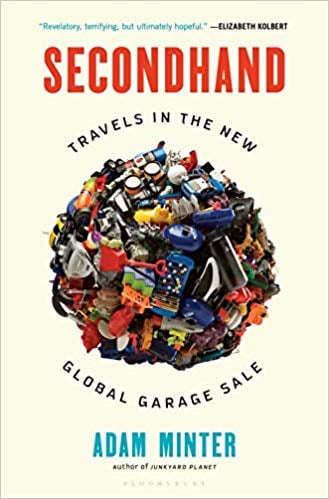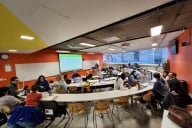You have /5 articles left.
Sign up for a free account or log in.
 Secondhand: Travels in the New Global Garage Sale by Adam Minter
Secondhand: Travels in the New Global Garage Sale by Adam Minter
Published in November 2019
We downsized when our kids went to college. Did you?
Where does all the stuff that we drop off at Goodwill (or, in our case, Listen Community Services) go?
What happens to all that sports equipment, furniture, clothing and assorted detritus of American life?
If you are curious about the path that your stuff takes from donation to final destination, then Secondhand is a book that you should buy new. (Although on Amazon, you can buy the book used).
As Secondhand explains, America has become awash in stuff. In our grandparents' day, items such as furniture and appliances and clothing were built to last. Today, most consumer goods are made cheaply. It often feels more cost-effective to replace an item than repair it.
The problem of what do with this glut of stuff is made more acute by our rapidly aging population. The kids don't want Mom's furniture. Minter details the growing industry of home clean outs, where specialists pack up the homes of aging or deceased relatives. Clean-out businesses are a vast and growing industry in Japan, driven by an aging society.
Minter, who comes from a family that vaulted itself into the middle class through the salvage business, is obsessive in tracking down the story of our unwanted goods. As you might expect, a large proportion of used furniture and appliances and toys and clothing and electronics and other products ends up being exported.
Some of the best chapters in Secondhand are the ones that follow our stuff to Mexico, Africa and Asia. Most of the conventional wisdom about used electronics turns out to be wrong. Highly skilled technicians and merchants in Africa are experts in repairing and refurbishing and reselling the computers, TVs and cellphones we discard.
The parts of Secondhand that I think higher ed people will enjoy most are the places when Minter talks about the second acts of books.
Let me ask you this: How many books do you have at your home and your office? Hundreds? Thousands?
What is your plan for all your books?
Your academic library is likely not to want them. Same for your local public library. The local used book store may take them, but maybe not.
In Secondhand, Minter visits the headquarters of Bookoff, Japan's largest used-book seller. Japanese residents can ship their books to Bookoff, and the company will then send an email back with an offer to purchase. The books are subsequently sold at Bookoff stores and online.
Does the U.S. have anything like Bookoff?
Has the availability of digital goods caused you to dematerialize your life?
How has your relationship to material goods changed over your lifetime?
What books do you recommend about changing patterns of production and consumption?
Secondhand is the ideal book for those who like to collect stuff, those who are trying to get rid of stuff and those who are curious about where stuff ends up.
What are you reading?








